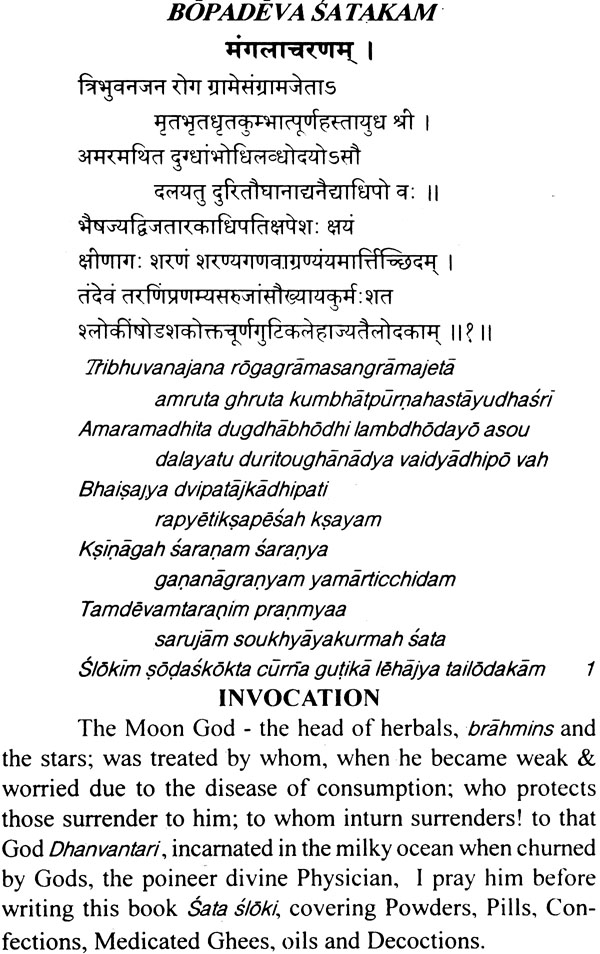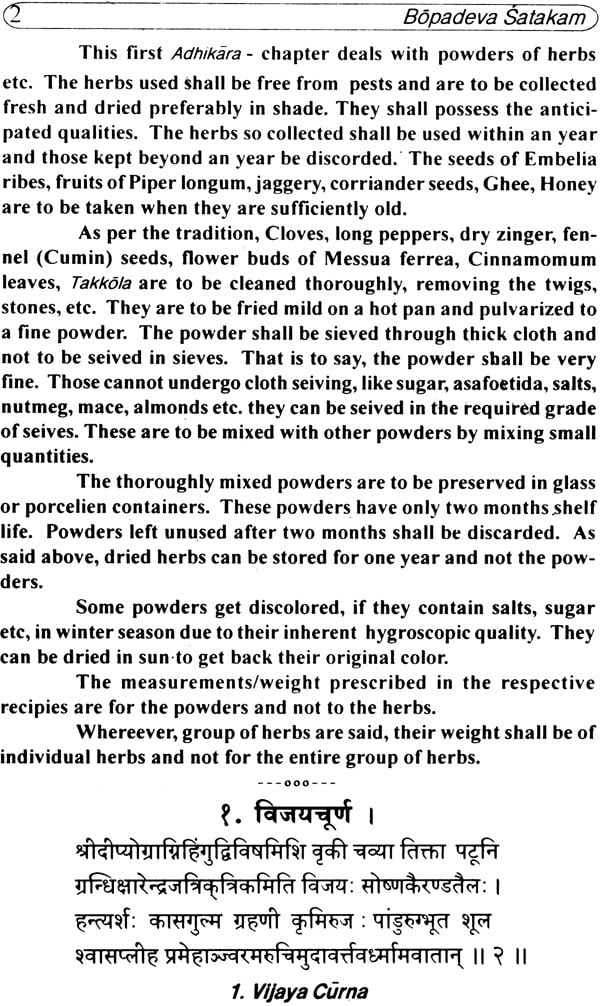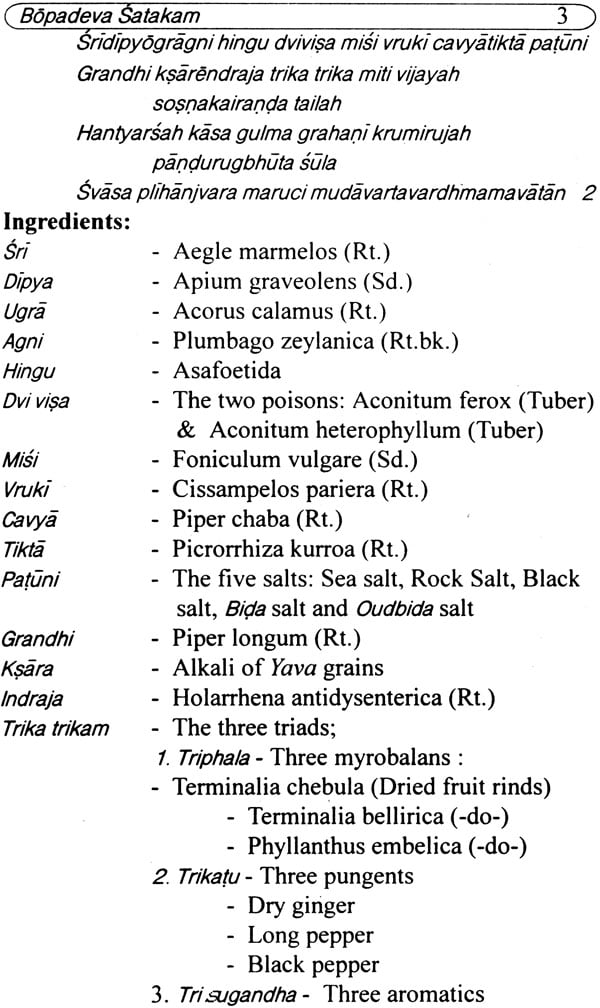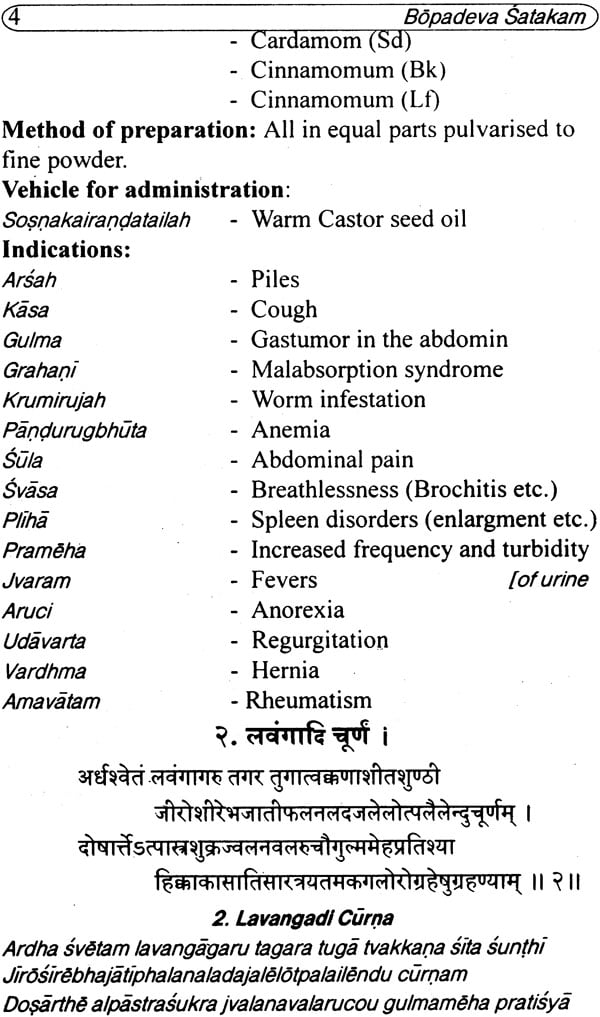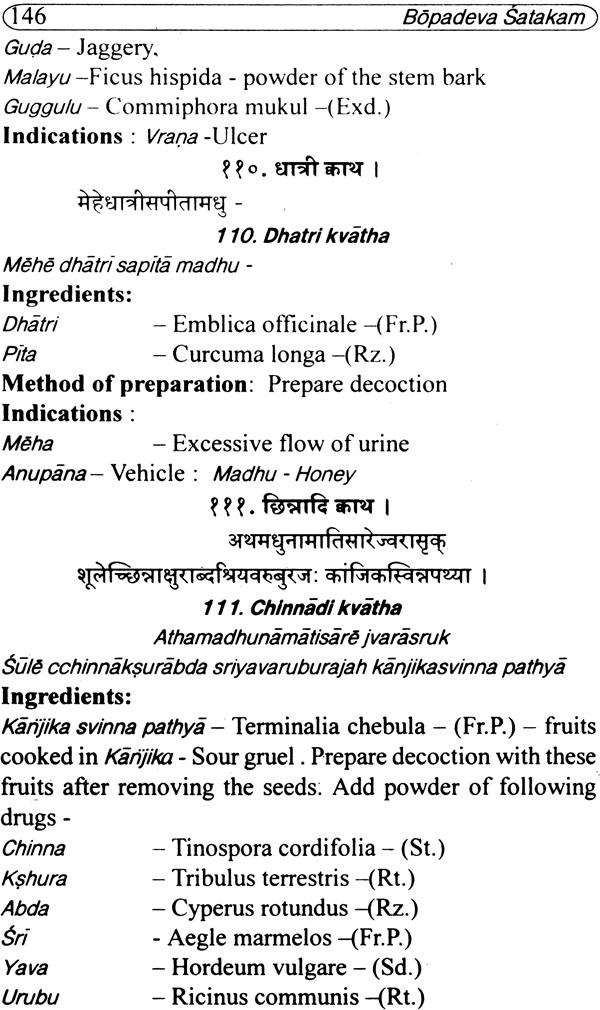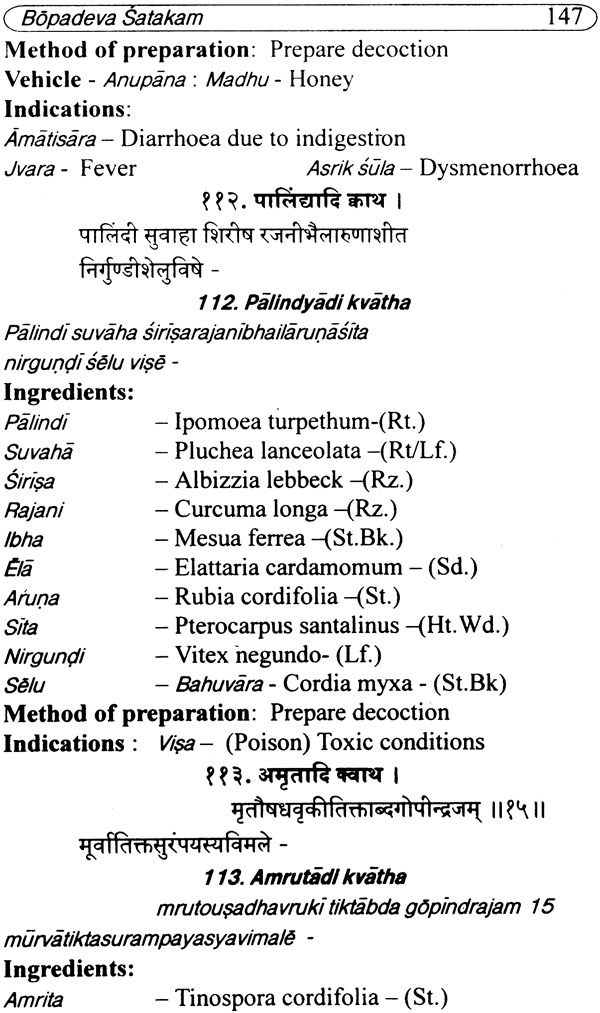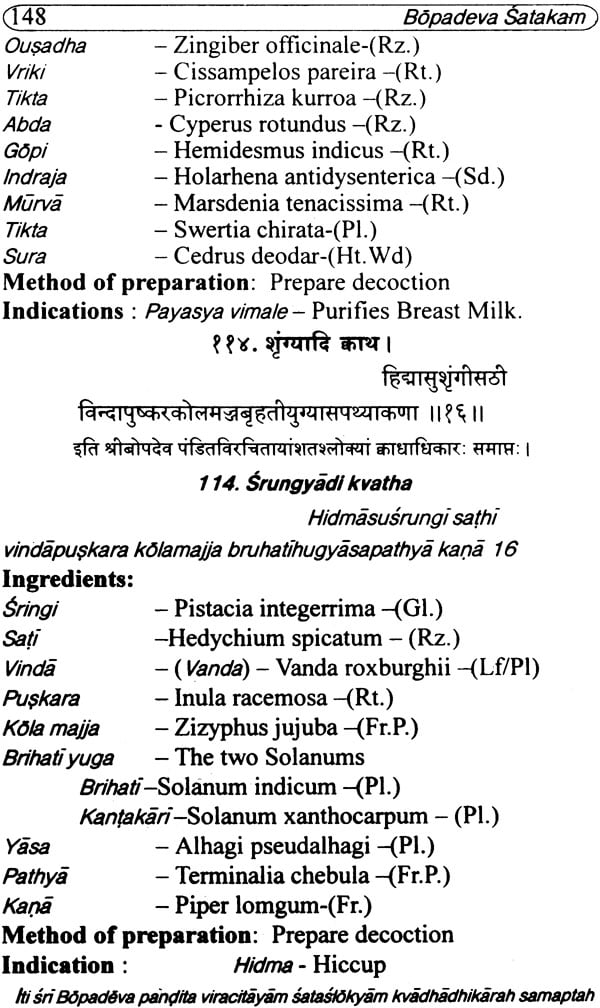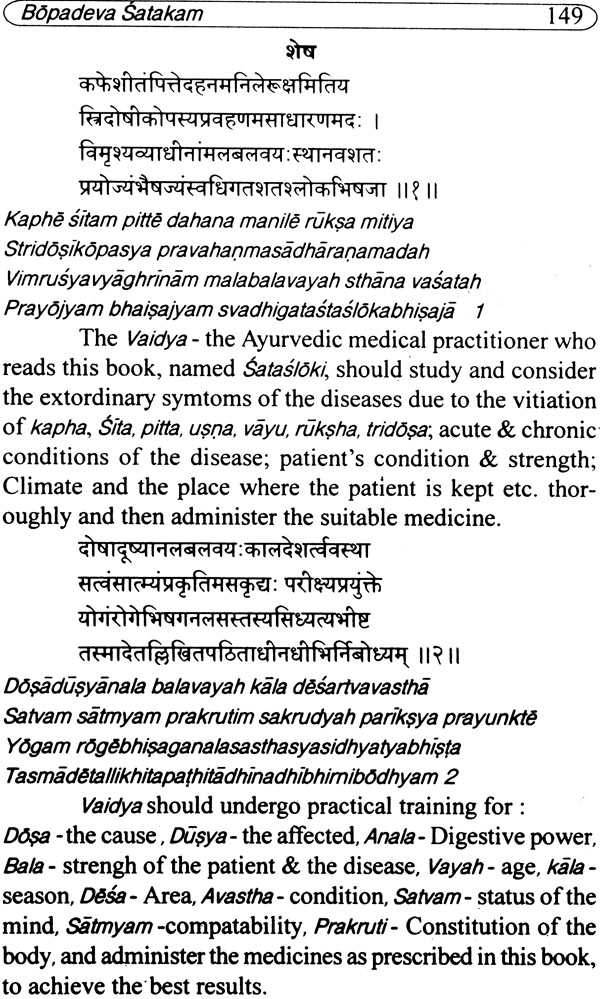
Bopadeva Satakam (Sata sloki) (Text, Transliteration and Translation)
Book Specification
| Item Code: | IDL059 |
| Author: | Vaidya Smt. Bharati Kumaramangalam, Edited by: Uttama Vaidya Pammi Satyanarayana Sastri |
| Publisher: | Chowkhamba Sanskrit Series Office |
| Language: | Text, Transliteration and Translation |
| Edition: | 2008 |
| ISBN: | 9788170802830 |
| Pages: | 170 |
| Cover: | Hardcover |
| Other Details | 9.0" X 5.8" |
| Weight | 300 gm |
Book Description
In this Sata Sloki popularly known as Bopadeva sataka, majority of the recipes description are of Herbal formulations). Different categories of formulations are described under six chapters namely Curnadhikaram containing 15 powder formulations, Gutikadhakaram containing 19 pill formulations, Avalehadhikaram contaning 16 electuary formulations, Ghritadhikaram contaning 16 Ghee preparations. Tailadhikaram contaning 13 Oil preparations, and Kvathadhikaram containing 35 decoctions. Among all these, Ojaskarigutika, Anjanigutika Khadiradyavaleham are unique in this book. Maximum number are of Decorations numbering 35 (one third of the total 114). The next are Pills numbering 19. This shows the popularity of mode of administration for best efficacy.
An attempt has been made to present this book in English speaking Ayurvedists. Latin names and useful part of each drug along with the quantity of all formulations and modern terminology for the ailments have been provided for easy reference.
At the end one Glossaries of Drugs and Diseases have been added. Weights and measures in metric system are given in some formulations. The conversions given in the Ayurvedic formulary of india were appended for the convenience.
There are Sataka s in Ayurveda. Sataka means containing one hundred (usually 108). One is Yoga Satakam of vararuci (published with my English translation recently) and the other is the present one. These two deal with various recipes and are ancient. There is another vanousadhi sataka by vaidya Sri Durga Prasad Sharma published by M/s. Baidyanadha Ayurveda Bhawan. This deals with materia medica of one hundred herbals published about 50 years ago.
Though the names of the recipes seems to be very familiar, he ingredients are different from the other classics. Hence, to be construed to be based on based on trials and efficacy found.
Few details known, about the author is given. It is also opined that Bhagavata purana was written by Bopadeva. Generally the language used in Purana grandhas are lucid so that the general public can read and understand. But, the language of this Sataka (Sata sloki) is little tough. The weight s/proportions are difficult to decipher. The rare synonyms of drugs were selected. Probably the author desired to show all his hold on the language in this book. However, unless all the works of Bopadeva mentioned by Prof.P.V.Sharma are critically studied and correlated, no conclusions can be drawn.
The chandrakala commentary written by the author himself, which was said to have been published from Kottayyam was not available for us better correction.
Vaidya Smt. Bharati did the translation well. Hope this will help Ayurvedists worldover and and the Ayurveda itself.
As stated by the author himself in the colophon that his name is Bopadeva, son of Kesava and a desciple of his fathers brother (peternal uncle) Dhanesha. He did not mention about his period. His place is Varada tata.
Dr. Priyavat Sharma in his book History of Ayurvedic Literature as under.
Bopadeva, who was great scholar and a close friend not only wrote a commentary called chandrakala on Sarangodhara samhita, but a book called Satasloki,) popular as Bopadeva sataka) on the methods of prescriptions and wrote a commentary on it. It starts with obeisance to Sun God. It has the following sections: Powders, electuaries (avalehas) Gutika, Ghee, oils and Decoctions. Each section is described in 16 verses. It comprises the prescriptions popular in those days. In the end the author gave his biographical details. His time is the later pert of 13th C. after Sarangadhar samhita. Satasloki with candrakala commentary was published from Kottayam in 1962.
Dr. Priyavat Sarma also wrote elsewhere as under:
Bopadeva son of Kesava wrote a scholarly commentary on Siddha mantra. Hridaya dipika was also written by Bopadeva He was the disciple of Ghaneswara, court scholar of King of Devagiri, Mahadeva (1260-1217). He was close friend of Hemadri, the chief minister. To please Hemadri Bopadeva wrote Harilila and his biography. In return Hemadri wrote commentaries on Harilila and Muktaphala. Probably, Bopadeva was elder than Hemadri.
Bopadeva wrote on apart from Ayurveda, Jyotisha, and Dharma Sastra. His works are Satasloki with chandrakala commentary, Hridaya dipika nighantu, Prakasa commentary on Siddha mantra, and Gudartha dipika commentary on Sarangadhara Samhita. Several ancient authors were quoted by him in Siddhamantra commentary.
| | ||
| | ||
| | ||
| 1. | Vijaya Curnam | 2 |
| 2. | Lavangadi Curna | 4 |
| 3. | Caturjatadi Curna | 6 |
| 4. | Dhanyadi Curna | 8 |
| 5. | Narayana Curna | 9 |
| 6. | Narasimha Curna | 12 |
| 7. | Bharangyadi Curna | 13 |
| 8. | Bhaskara Curna | 15 |
| 9. | Abhadi Curna | 16 |
| 10. | Hingvadi Curna | 17 |
| 11. | Khandava Curna | 19 |
| 12. | Sardula Curna 1 | 20 |
| Sardula Curna 2 | 21 | |
| 13. | Agnimukha Curna | 22 |
| 14. | Sitophaladi Curna 1 | 25 |
| Sitophaladi Curna 2 | 25 | |
| | ||
| | ||
| 15. | Krishna Modaka | 27 |
| 16. | Manibhdhra Modakam | 28 |
| 17. | Hingvadi Gutika | 29 |
| 18. | Darvyadi Gutika | 30 |
| 19. | Surna Vataka | 31 |
| 20. | Kanakayana Gutika | 32 |
| 21. | Trijatadi Modaka | 32 |
| 22. | Dipyadika Modaka | 34 |
| 23. | Talisadi Modaka | 35 |
| 24. | Shambukadi Vati | 36 |
| 25. | Kaishora Guguulu | 37 |
| 26. | Yogaraja Guguulu | 38 |
| 27. | Abhadi Vataka | 40 |
| 28. | Khadiradi Gutika | 42 |
| 29. | Koladi Gutika | 44 |
| 30. | Dantyadi Vataka | 45 |
| 31. | Madhu Vataka | 46 |
| 32. | Ojaskari Gutika | 47 |
| 33. | Anjani Gutika | 49 |
| | ||
| | ||
| 34. | Kushmanda Leha | 52 |
| a). Surana Leham | 53 | |
| 35. | Agasthiharitaki Avaleha | 53 |
| 36. | Ardrakavaleham | 55 |
| 37. | Bharangi Shivanama Avaleham | 56 |
| 38. | Kamsaharitaki nama Valeham | 58 |
| 39. | Vasaharitaki Avaleham | 59 |
| 40. | Cithrakaharitaki nama Avaleham | 60 |
| 41. | Danti Shiva nama Avaleham | 62 |
| 42. | Vyaghri pathyavaleha | 63 |
| 43. | Kantakari Avaleha | 64 |
| 44. | Kutajashtakavaleha | 65 |
| 45. | Khadiradyaveleha | 66 |
| 46. | Kalyanakavaleha | 67 |
| 47. | Cyavanaprasavaleha | 69 |
| 48. | Akshavaleha | 72 |
| 49. | Pancajirakavaleha | 72 |
| | ||
| | ||
| 50. | Shatphala Ghrita | 74 |
| 51. | Varja Ghrita | 76 |
| 52. | Rasnadi Ghrita | 77 |
| 53. | Kalyana Ghrita | 79 |
| 54. | Phala Ghrita | 80 |
| 55. | Panca Gavya Ghrita | 82 |
| 56. | Bindu Ghrita | 85 |
| 57. | Jathyadi Ghrita | 85 |
| 58. | Cangeri Ghrita | 86 |
| 59. | Dhanvantri Ghrita | 87 |
| 60. | Atarusha Ghrita | 87 |
| 61. | Sukumara Ghrita | 90 |
| 62. | Brihat Pancamula Ghrita | 92 |
| 63. | Ashtanga Ghrita | 93 |
| 64. | Tikta Ghrita | 94 |
| 65. | Narasimha Ghrita | 96 |
| | ||
| | ||
| 66. | Prasarini Taila | 98 |
| 67. | Masha Taila | 102 |
| 68. | Kshara Taila | 104 |
| 69. | Satavari Taila | 105 |
| 70. | Varja Taila | 106 |
| 71. | Narayana Taila | 107 |
| 72. | Bala Taila | 110 |
| 73. | Anvasana Taila | 112 |
| 74. | Shatbindu Taila | 114 |
| 75. | Murva Taila | 114 |
| 76. | Laksha Taila | 115 |
| 77. | Guducyadi Taila | 117 |
| 78. | Mahanila Taila | 118 |
| 79. | Brahmi Taila | 120 |
| | ||
| | ||
| 80. | Maha Kvatha | 121 |
| 81. | Trisasnadi Kvatha | 123 |
| 82. | Murvadi Kvatha | 125 |
| 83. | Darvyadi Niruha | 127 |
| 84. | Drakshadi Kvatha | 128 |
| 85. | Bhunimbadi Kvatha | 129 |
| 86. | Vishanyadi Kvatha | 130 |
| 87. | Shringyadi Kvatha | 131 |
| 88. | a). Pathyadi Kvatha | 132 |
| b). Himadi Kvatha | 132 | |
| 89. | Ativishadi Kashaya | 133 |
| 90. | Mustadi Kvatha | 134 |
| 91. | Gokshuradi Kvatha | 134 |
| 92. | Haridradi Kvatha | 135 |
| 93. | Dipyadi Kvatha | 135 |
| 94. | Darvyadi Kvatha | 136 |
| 95. | Triphaladi Kvatha | 137 |
| 96. | Candanadi Kvatha | 137 |
| 97. | Vyaghradi Kvatha 1 | 138 |
| 98. | Vyaghradi Kvatha 2 | 139 |
| 99. | Sringyadi Kvatha | 139 |
| 100. | Yavadi Kvatha | 140 |
| 101. | Vyaghradi Kvatha 3 | 141 |
| 102. | Atarushadi Kvatha | 142 |
| 103. | Dashed Kvatha | 142 |
| 104. | Tila Kvatha | 143 |
| 105. | Sunti Kvatha 1 | 143 |
| 106. | Sunti Kvatha 2 | 144 |
| 107. | Rasnadi Kvatha | 144 |
| 108. | Suntyadi Kvatha 3 | 145 |
| 109. | Phalgvadi Kvatha | 145 |
| 110. | Dhathri Kvatha | 146 |
| 111. | Chinnadi Kvatha | 146 |
| 112. | Palindyadi Kvatha | 147 |
| 113. | Amritadi Kvatha | 147 |
| 114. | Sringyadi Kvatha | 148 |
| Sesa | 149 | |
| Authors introduction | 150 | |
| Glossary of Drugs | 151 | |
| Glossary of Diseases | 163 |
